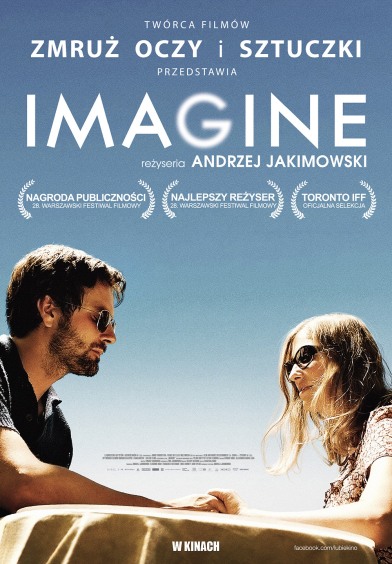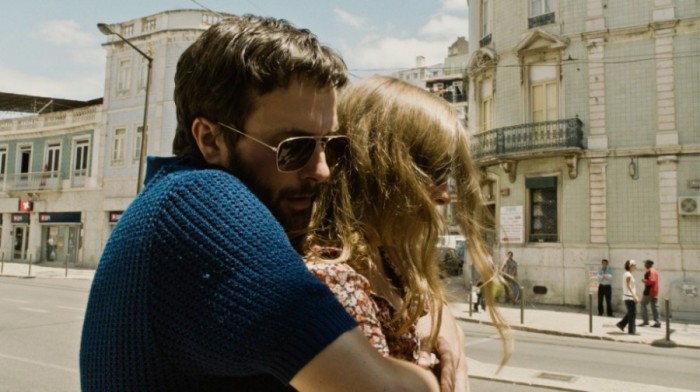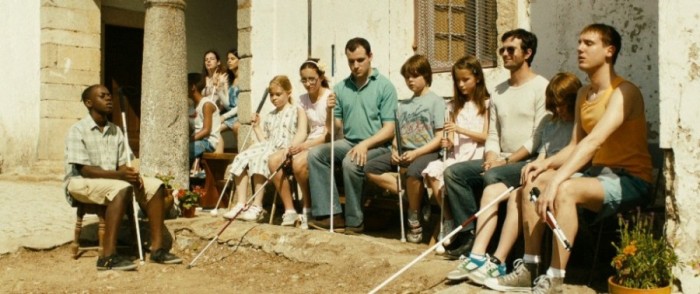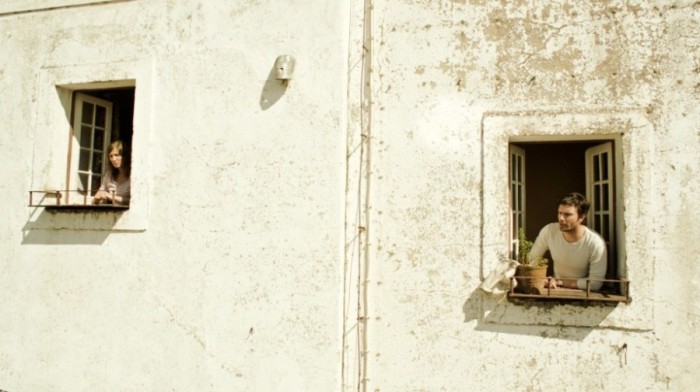I saw Andrzej Jakimowski’s Imagine at the Polish embassy as part of the European Film Festival. It has absolutely nothing to do with China, but it is a thing I did while in China, and it was too good not to blog about.
 The basic premise: a new guy, Ian, comes to teach at a school for the blind (in Italy? Everyone spoke English, but I think it was Italy) who fairly shakes things up. He refuses to walk with a cane even though he’s blind as well, and encourages the kids at the school to use their imagination to understand the world around them. Rather than tapping around with a cane, he listens to the city, to the school, sometimes claps or snaps and listens to the reverberations to better understand spaces.
The basic premise: a new guy, Ian, comes to teach at a school for the blind (in Italy? Everyone spoke English, but I think it was Italy) who fairly shakes things up. He refuses to walk with a cane even though he’s blind as well, and encourages the kids at the school to use their imagination to understand the world around them. Rather than tapping around with a cane, he listens to the city, to the school, sometimes claps or snaps and listens to the reverberations to better understand spaces.
The head of the school (who is not blind) strongly objects to Ian’s teaching methods, insisting that Ian is a danger to himself and to the students. He sees the lack of a cane as reckless, especially since Ian confidently does out of the school’s gates and into the city every night. Ian slowly shows the students of the school what they can do even though they can’t see, and how to navigate the city by themselves.
 It was an incredibly beautiful movie in terms of cinematography, direction, and the acting. The acting as really superb as well. What I liked best was probably how the director showed a really limited amount of space. The viewer could only see what the characters could understand through touch or hearing. One of the running themes throughout the film was the presence of a ship in the harbor. Rather than ever show the harbor, though, the camera focussed on the characters as they talked about the ship. We could only hear the bells tolling from a church, reverberating off of a large object, and the sound of motors that we were told were motorboats.
It was an incredibly beautiful movie in terms of cinematography, direction, and the acting. The acting as really superb as well. What I liked best was probably how the director showed a really limited amount of space. The viewer could only see what the characters could understand through touch or hearing. One of the running themes throughout the film was the presence of a ship in the harbor. Rather than ever show the harbor, though, the camera focussed on the characters as they talked about the ship. We could only hear the bells tolling from a church, reverberating off of a large object, and the sound of motors that we were told were motorboats.
Towards the end of the film, when two of the characters go looking for the ship we never do get a shot of the thing itself, but only the pieces of it that the characters discover. As a result, it’s never clear to us if what Ian describes actually exists, and this is a point of tension with the other characters as they’re never sure whether to believe him or not. They accuse him of lying about the harbor, the ship, about being able to walk without a cane.
There’s also this really wonderful sort of love story running throughout between Ian and the woman above as he tries to show her how much of the world she can see without actually seeing anything, and how far her imagination can take her. The scenes where they’re walking through the city together, both without canes, are some of the most beautiful in the whole film.
My other favorite scenes were the ones where Ian and the woman (I forget her name unfortunately) are at their windowsills, pictured above. The woman puts seeds out for the sparrows every morning and listens to them pecking at the metal windowsill. Ian starts mimicking a new bird, one she’s never heard before, by dropping sunflower seeds on his sill and tapping at it with a wire. He flaps a sheet to imitate the sound of wings taking off. At first, the woman is annoyed that he’s chasing off the sparrows with all the noise he makes, but by the end she’s putting out sunflower seeds too, hoping to catch the sound of Ian’s bird. This interaction between the two really demonstrated the rationale behind the title–how imagination can be one of the most valuable senses through which we understand the spaces around us.
I also loved the underlying motivations behind the fight between the headmaster of the school and Ian–that being blind doesn’t mean you’re powerless and need to rely on a cane to get around. Although the headmaster was insistent on the use of canes out of concern for his students–many of them got injured throughout the movie, and there was one man they saw briefly who had gotten into a nearly fatal accident that crippled him for life–Ian tried to show the students that they weren’t irreparably damaged and didn’t need to be afraid of the world, that they could see things in their own way and learn to live independently.
I don’t know if this is going to screen in other cities/countries, but I highly recommend it if you ever come across a copy.


I’m happy finally our movies got appreciated 🙂